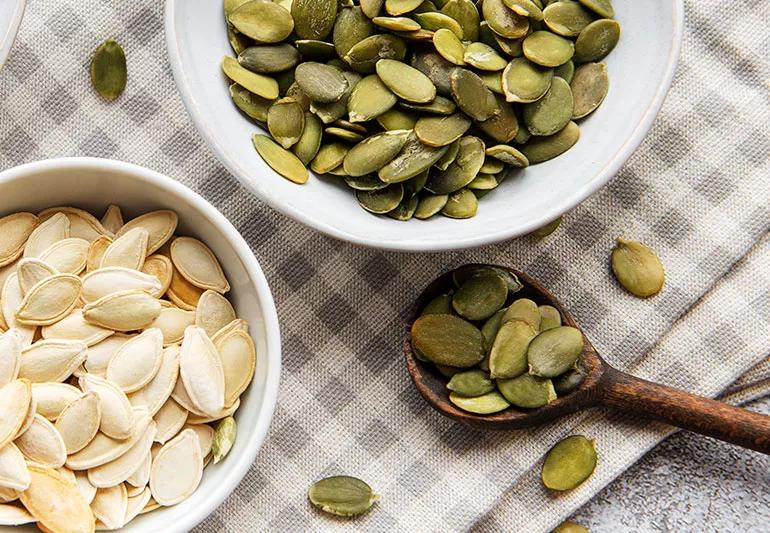With delightful recipes fit for fall

Image content: This image is available to view online.
View image online (https://assets.clevelandclinic.org/transform/a207b1fc-c378-462e-9fe2-2d8568f3e3d6/eatPumpkinSeeds-1310047583_770x533_jpg)
eat pumpkin seeds
Carving pumpkins is a great fall pastime, but think twice before you clean up the mess and throw out those pumpkin seeds!
Advertisement
Cleveland Clinic is a non-profit academic medical center. Advertising on our site helps support our mission. We do not endorse non-Cleveland Clinic products or services. Policy
“Pumpkin seeds have many health benefits and make for a nutritious snack,” says registered dietitian Maxine Smith, RD.
Check out all the benefits of pumpkin seeds below, and as a bonus, some delicious, fall-flavored pumpkin seed recipes you and the whole family can enjoy!
Pumpkin seeds can be raw or roasted. In addition to bringing to life the flavors, aroma and texture, roasting also increases the amounts of antioxidants available. It also makes them easier to digest!
Raise your hand if you’re all-in on healthy fats! Whether you leave your pumpkin seeds shelled (just as they are, fresh out of a pumpkin-carving sesh) or opt for shell-free seeds you can buy at the grocery store, you’re in for a real treat (no tricks here!).
“Pumpkin seeds are a good source of plant protein and other nutrients which can act as antioxidants to help protect against certain diseases,” says Smith.
And how about this great news for vegetarians: Pumpkin-seed protein is a very high-quality protein — comparable to soy protein — containing all of the essential amino acids you’re looking for outside of meat!
Pumpkin seeds are filled with valuable nutrients to keep you on track with a healthy diet, among these other health benefits:
Advertisement
It’s been shown that diets rich in pumpkin seeds come with a reduced risk of developing breast, stomach, lung, prostate and colon cancers.
The lignans (plant compounds) found in pumpkin seeds get the credit here.
Several studies have shown that pumpkin seeds help to relieve an overactive bladder and prostate hyperplasia (a prostate condition that causes issues with urination).
This is due to the high magnesium, zinc and fatty acid content found in pumpkin seeds.
Pumpkin seeds contain tryptophan, an amino acid that helps you fall (and stay) asleep. Zinc and magnesium help here, too.
“Something to be aware of is that pumpkin seeds with shells contain much more fiber than those without. So if your stomach isn’t used to that much fiber, you may experience some issues,” says Smith. “Start off with just a few.”
Pumpkin seeds without shells are still very healthy and contain a good amount of heart-healthy fats and protein. Many of these will have much less sodium, even if lightly salted, than ones with shells. “You do lose most of the fiber, however,” says Smith.
Pumpkin seeds with shells are an excellent source of fiber but can have a ton of sodium — some more than the daily recommended amount of sodium in just 1 ounce. “I recommended opting for unsalted or lightly salted options,” says Smith.
Sure, your fresh pumpkin seeds may be surrounded by gobs of pumpkin pulp, but they’re simple to prepare for a snack! All you have to do is:
If you need some recipe ideas, we’ve got you covered:
Calories will be higher for flavor options that include sugar or honey. If you’re constantly craving pumpkin, check out these other dietitian-approved pumpkin recipes.
While they’re a great source of energy, pumpkin seeds are easy to overeat. Just as you remind your kids to not eat their Halloween candy all in one night, remind yourself to share or watch your portion size with pumpkin seeds!
Advertisement

Delivered every Tuesday!
Sign up for our Health Essentials emails for expert guidance on nutrition, fitness, sleep, skin care and more
It's a letter about the news!
Learn more about our editorial process.
Advertisement
Packed with fiber, antioxidants and vitamins, chia seeds are good for you and your gut
A dietitian explains the science behind this TikTok trend
How to incorporate seeds into a healthy diet
A delicious twist on this classic dish
A creamy and satisfying side dish
Lettuce is a versatile vegetable loaded with antioxidants and good-for-you nutrients
This unique-looking veggie is fiber-dense and antioxidant-rich, and can improve the health of your gut, liver and heart
A satisfying and savory meal sure to impress family and friends
Type 2 diabetes isn’t inevitable with these dietary changes
Applying a hot or cold compress can help with pain
Pump up your iron intake with foods like tuna, tofu and turkey